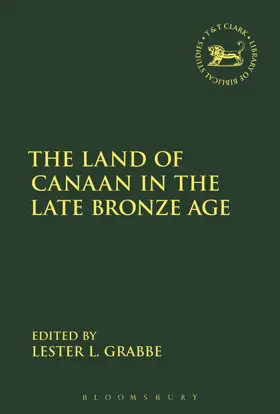

The Land of Canaan in the Late Bronze Age
in Library of Hebrew Bible/Old Testament Studies
Pages
256
Publisher
T&T Clark
Published
2/9/2017
ISBN-13
9780567672810
This volume provides a series of contributions on the crucial aspects relating to the Bible and the Late Bronze Age period. The volume is introduced with a background essay surveying the main areas of history and current scholarship relating to Late Bronze Age Palestine and to the Egyptian New Kingdom (Dynasties 18-20) domination of the region, as well as the question of the biblical account of the same geographical area and historical period.
Specific chapters address a range of key concerns: the history of Egypt's dealing with Canaan is surveyed in chapters by Grabbe and Dijkstra. The Amarna texts are also dealt with by Lemche, Mayes and Grabbe. The archaeology is surveyed by van der Steen. The Merenptah Stela mentioning Israel is of considerable interest and is discussed especially by Dijkstra. This leads on to the burning question of the origins of Israel which several of the contributors address. Another issue is whether the first Israelite communities practised egalitarianism, an issue taken up by Guillaume, with a response by Kletter.
Specific chapters address a range of key concerns: the history of Egypt's dealing with Canaan is surveyed in chapters by Grabbe and Dijkstra. The Amarna texts are also dealt with by Lemche, Mayes and Grabbe. The archaeology is surveyed by van der Steen. The Merenptah Stela mentioning Israel is of considerable interest and is discussed especially by Dijkstra. This leads on to the burning question of the origins of Israel which several of the contributors address. Another issue is whether the first Israelite communities practised egalitarianism, an issue taken up by Guillaume, with a response by Kletter.
- Table of contents
- Preface
- Acknowledgements
- Contributors
- Part One: Introduction and Background
- 1. Introduction – Lester L. Grabbe, University of Hull, UK
- 2. The Late Bronze Age: If We Had Only the Bible – Lester L. Grabbe, University of Hull, UK
- Part Two: Articles
- 3. Canaan in the Transition from the Late Bronze to the Early Iron Age from an Egyptian Perspective – Meindert Dijkstra, University of Utrecht, Netherlands
- 4. Canaan under the Rule of the Egyptian New Kingdom: From the Hyksos to the Sea Peoples – Lester L. Grabbe, University of Hull, UK
- 5. Poor by Necessity or by Choice? Ancient Israelite Egalitarianism – Philippe Guillaume, University of Bern, Switzerland
- 6. Land Tenure, Ideology, and the Emergence of Ancient Israel: A Conversation with Philippe Guillaume – Raz Kletter, University of Helsinki in Tallinn, Estonia
- 7. The Impact of the Late Bronze III Period on the Origins of Israel – Ernst Axel Knauf, University of Bern, Switzerland
- 8. International Diplomacy in the Amarna Age – Andrew D.H. Mayes, Trinity College Dublin, Ireland
- 9. The Amarna Letters and Palestinian Politics – Neils Peter Lemche, University of Copenhagen, Denmark
- 10. The Archaeology of the Late Bronze Age in Palestine – Eveline van der Steen, University of Liverpool, UK
- Part Three: Conclusion
- 11. Conclusion – Lester L. Grabbe, University of Hull, UK
Inner Books
This physical volume has several internal sections, each of which has been reviewed independently
- The Late Bronze Age: If We Had Only the Bible by Lester L. Grabbe
- Canaan in the Transition from the Late Bronze to the Early Iron Age from an Egyptian Perspective by Meindert Dijkstra
- Canaan under the Rule of the Egyptian New Kingdom: From the Hyksos to the Sea Peoples by Lester L. Grabbe
- Poor by Necessity or by Choice? Ancient Israelite Egalitarianism by Philippe Guillaume
- Land Tenure, Ideology, and the Emergence of Ancient Israel: A Conversation with Philippe Guillaume by Raz Kletter
- The Impact of the Late Bronze III Period on the Origins of Israel by Ernst Axel Knauf
- International Diplomacy in the Amarna Age by Andrew D. H. Mayes
- The Amarna Letters and Palestinian Politics by Niels Peter Lemche
- The Archaeology of the Late Bronze Age in Palestine by Eveline van der Steen